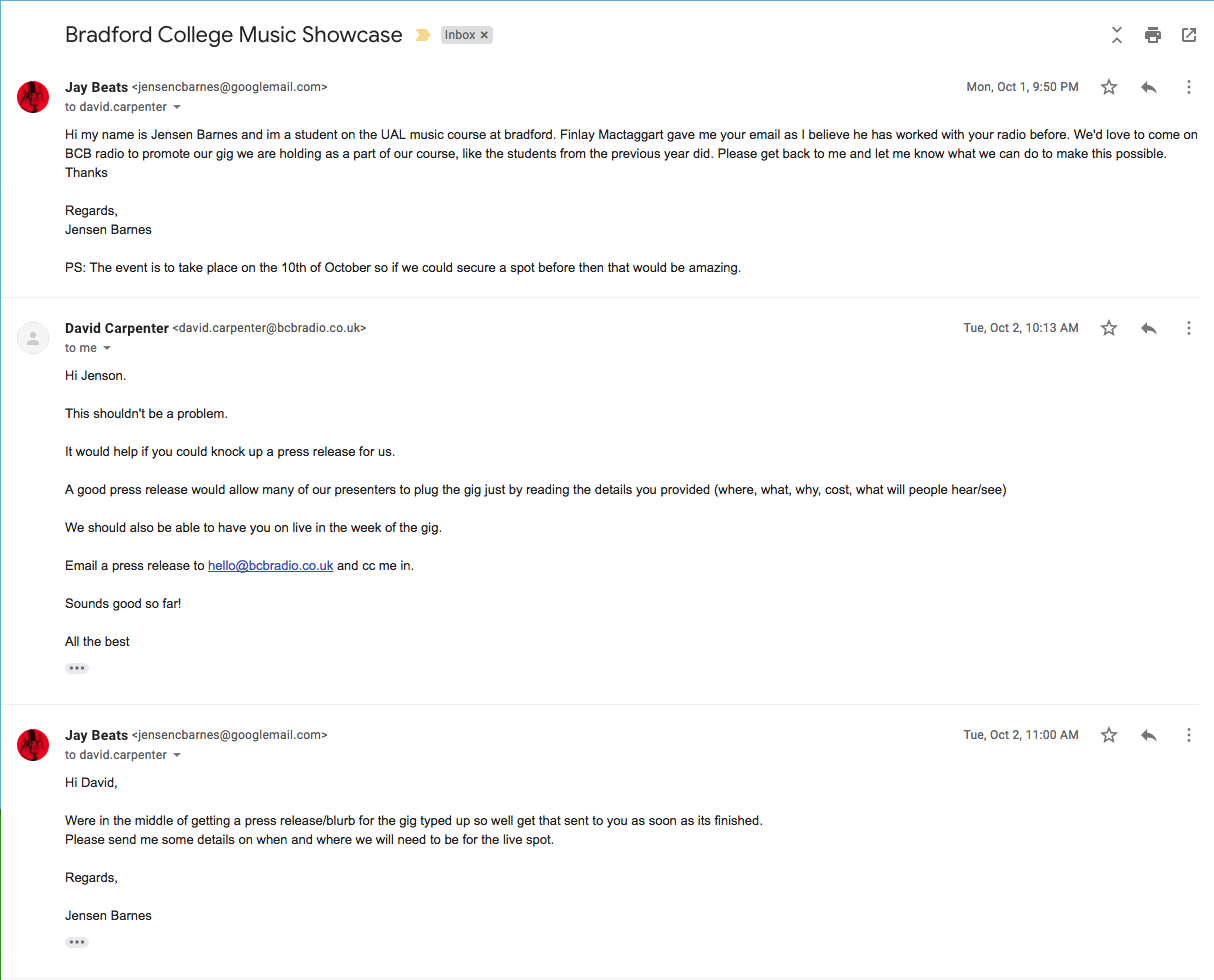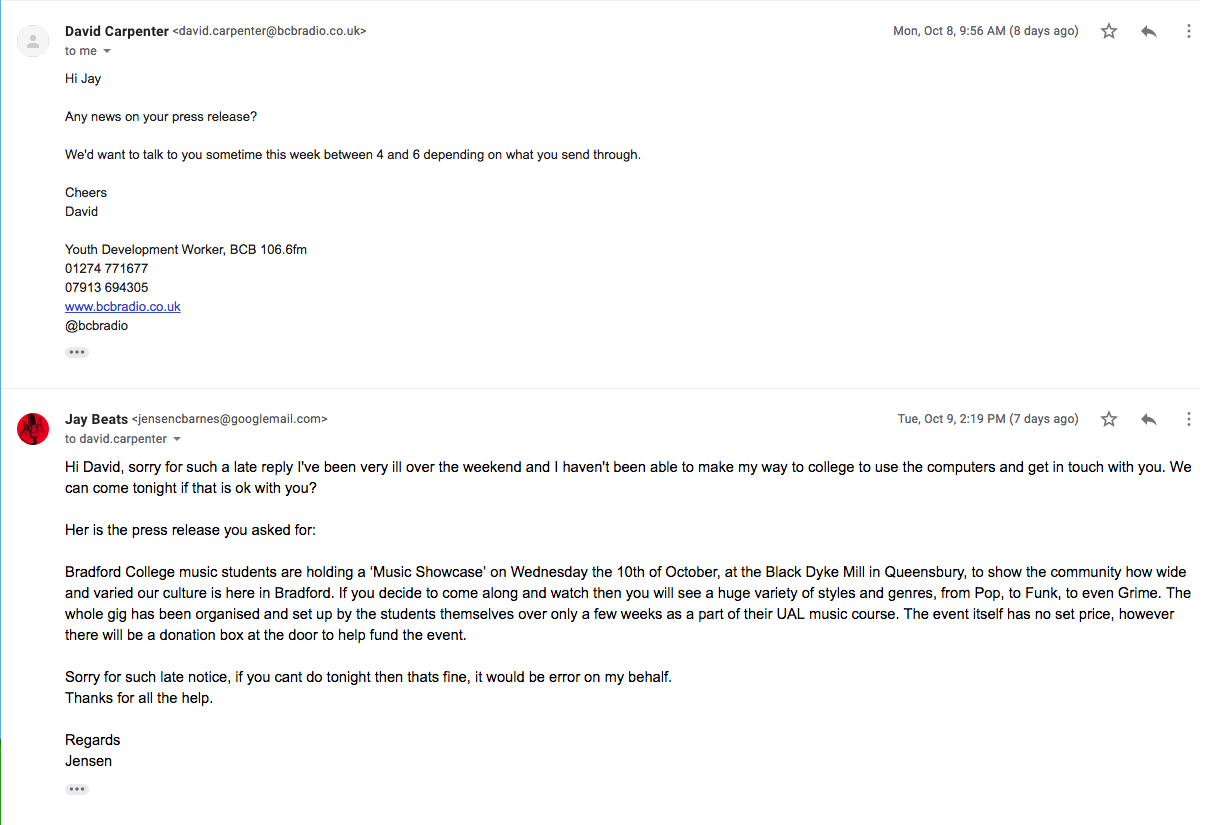The main purpose of this project was to learn about event management and production. After researching into the basics of what this boiled down to, I found that there were several main responsibilities an event manager would have when putting an event together:
- Stage Management
- Sound & Light Equipment Management
- Budgeting & Contracting
- Promotion
- Digital
Each of us were assigned a role, however, after we were assigned these roles, we switched roles methodically to ensure that everyone had a role best suited to them.
The role I was assigned when we started this project was print promotion. After doing some research I found that my main roles and responsibilities included getting in touch with radio stations, newspapers, magazines, etcetera to promote the event effectively and reach out to as many people as possible. Also, I was responsible for creating a press release, and distributing flyers and posters around to help promote the event. This meant I would have to work very closely with the digital promoters to ensure that all the promotion worked together and wasn’t contrasting in style and purpose.
The key differences between digital and print promotion are quite obvious, firstly, digital focuses on using social media and websites to promote an event, whilst print promotion focuses on ‘older’ promotional techniques, like using radios and posters, etcetera. However, even though the techniques are ‘older’ they are just as relevant now as they were 10 years ago, everyone listens to the radio in the car, and even though online news is blowing up, a lot of people still rely on newspapers for reliable information, meaning that these sources of promotion aren’t as useless as many people make out. Print and digital promotion both hit just as large of an audience as each other and they both have the potential to be incredibly effective. The only real difference in effectiveness is who each type of promotion is most effective on, as digital promotion would be more relevant to the newer generations who are deeply involved with technology, whilst print promotion would be more effective with those that regularly read the news, or pay attention to posters or radio adverts, etcetera.
My first job as print promoter was to get in touch with our local radio station, BCB Radio, to try and arrange a spot on the radio to promote the event. I spoke to Finlay, a musician in my band, and he sent an email for one of the members of staff at the radio station called David.

I began by introducing myself, and the event, and providing a bit of context for the event before asking for help with promoting the event through the radio station. David actually got back to me rather quickly which was useful as he gave me a little guidance on how the press release should be written and what sort of information it should include. I then continued to begin writing the press release, which would’ve also been used with the T&A newspaper had I gotten around to sending it to Nic, our tutor, who said he knew some people from the newspaper who could help to get an advert in the newspaper for the event. However, after I emailed David saying I was working on getting a press release together for him, I missed a lot of college sessions due to poor health and personal issues which meant that I never got around to getting back in touch with David as I was focusing on trying to catch up with my performance work. When I finally got back around to getting in touch with David again, it was too late to organise a spot on the radio, and the few people that had said they would go on the radio to promote the event dropped out at the last minute and said they didn’t want to go, and so if we would’ve been able to go onto the radio, we would’ve been poorly presented and we wouldn’t have effectively promoted the event. If I had properly managed my own personal life and health then I should’ve been able to easily complete the tasks I was required to, I never realised how much personal life could interrupt my professional/educational life as much as it did.

Because of the amount of time I spent off, I wasn’t able to do much more other than stick up posters, that Ant had prepared as a part of his digital promotion, around Bradford and my local area to help promote the event.
For the work I did for my role, I was seriously lacking. I needed to be much faster producing the information that I needed, like the press release, to send to promotional sources, like BCB Radio, the T&A newspaper, etcetera. Due to the fact that I had not been fast enough to produce what I needed to, I missed out on a great opportunity to promote the event. In the future I will be much more prepared when it comes to promoting in this way, by having all the information and material I need ready before getting in touch with promotional sources. However, after the event when speaking to Nic, our course tutor, he told me that actually the venue was fully booked, and that if we had effectively promoted the event through print promotion, we may have actually put people at risk by going against standard health and safety procedures and over filling the venue. I myself was running up and down the venue grabbing extra chairs for the audience to sit in. So another thing to note for the future is to know how big my audience could be, and not over promoting the event if the only venue space I can use can’t safely fit my audience within it.